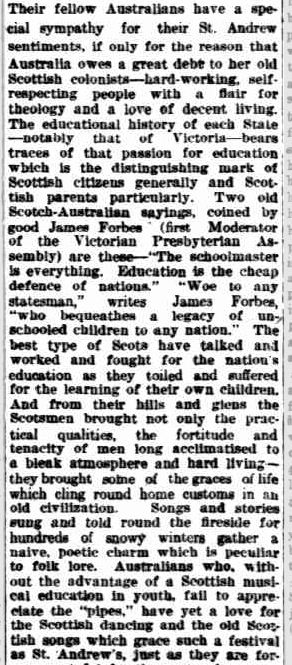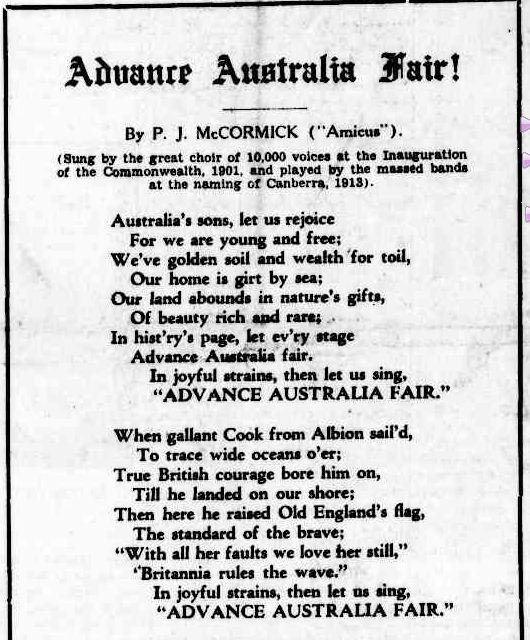I have made it just in time for the Australia Day 2012 blog post. Thanks to Shelly at Twigs of Yore, geneabloggers have the chance to share the occupation of an ancestor while considering the line “wealth for toil” from “Advance Australia Fair”. The requirements are:
To participate, choose someone who lived in Australia (preferably one of your ancestors) and tell us how they toiled. Your post should include:
- What was their occupation?
- What information do you have about the individual’s work, or about the occupation in general?
- The story of the person, focusing on their occupation; or
The story of the occupation, using the person as an example.
I love occupations. The first thing I look at on a census or electoral roll is my relative’s line of work. Maybe it is just because I’m hoping for something other than a farmer. So I jumped at the chance to share an occupation. Of course, I have plenty of farmers and a large number of butchers, including my grandfather and two great grandfathers. But they didn’t cut it for me.
Who were workers that fitted the “toil” definition? I have already done a post on Jim Bishop, the drover who I do believe toiled against the elements and probably for little reward. One definition of “toil” is to labour continuously. Taking that into account there could be no other person to write about than station hand William Hadden, my gg-grandfather.
William Hadden did not make monetary riches from his work, but he had the wealth of his family on whom his work depended and the knowledge that he was putting food on the table.
WILLIAM HADDEN
William was born in Haddington, East Lothian, Scotland, and immigrated with his parents, Charles and Agnes on the Marco Polo in 1854. William would have been around 17 when he went to work at nearby Mokanger station with his father Charles. That was the beginning of a love affair with the land and in particular Mokanger.
In 1870, he married Mokanger servant, Mary Mortimer at the station. They also lived at Mokanger and children were born there. Mokanger was their life. Except for Sundays, the day of rest. That was the time to attend St John’s Presbyterian church at Cavendish, William’s other passion.
While sheep station work can be seasonal, William most likely had an ongoing job. There is always plenty to do on a sheep property. Lambing, marking lambs, shearing sheep, crutching sheep, and dipping sheep! Also at Mokanger, William’s father Charles Hadden worked as a boundary rider, and father-in-law, James Mortimer was a ploughman, just two further examples of jobs on a large station.
William loved his work at Mokanger station so much, he was there into his eighties. I am not sure if he was still in paid employment then, but he was there overseeing the dipping and crutching. I think that qualifies as having toiled.
William’s value of hard work and love of the land was passed to his children, along with his quiet, unassuming nature. Son John, also worked at Mokanger, James worked at Mt Sturgeon station and Henry worked at Mooralla station as a boundary rider.
My favourite story of fourth son, my great grandfather Thomas Hadden relates to work. Each Sunday during the 1920s and ’30s, my great grandmother Sarah, would pack a week’s worth of food in a tin for Thomas to take away working on the roads. This must have been incredibly hard work and having to leave the family for a week at a time, must have made it harder. Likewise, Thomas and Sarah’s children, including my Nana, portrayed the same values and ethics as the Haddens before them.
William Hadden was happy to work for a wage for so many years, but as I have mentioned, it put food on the table. He was an honorable servant to the owners of Mokanger, first the Chirnside brothers and then the Gardiner family.
For as long as I can remember, I have considered the hard-working trait displayed by the Hadden family to be thanks to their Scottish heritage, something they were proud of. I don’t know why that is but the following is an excerpt from an article on St Andrew’s Day, 1922, which supports my theory.

ST. ANDREW’S DAY. (1922, November 30). The Register (Adelaide, SA : 1901 – 1929), p. 6. Retrieved January 26, 2012, from http://nla.gov.au/nla.news-article63739163
William Hadden probably enjoyed “Advance Australia Fair” penned by a Scot, P. J. McCormick. Happy Australia Day!

Advance Australia Fair!. (1938, January 26). The Canberra Times (ACT : 1926 – 1954), p. 1. Retrieved January 26, 2012, from http://nla.gov.au/nla.news-article2451050




oh dear – that final stanza of AAF is just criminal.
2. I love the photo of Thomas. plus, he has a kind face.
LikeLike
I know Ann, that’s probably why we don’t hear it.
Thomas does look nice. His children were lovely people and my Nana had so much respect for him.
LikeLike
It must have been difficult for your great grandfather to make sure he didn’t eat the week’s food in a few days!
LikeLike
It would have but I guess they were already eating frugally especially in the 30s. It would have been pretty uninteresting food, because it would have to be things that would keep for the week. Bread and dripping probably, one of my Nana’s favourites.
LikeLike
The week’s ‘food’ would have been tea, possibly cheese, jam, and flour for damper.
I have a friend (age 79) who grew up in huge wealth and she pines for the bread and dripping of her childhood in Monomeath Avenue – where her Rolls-Royce driving mother kept chooks.
I have contributed to the Twigs Of Yore meme thanks to you MR.
LikeLike
Thank you Ann for your great comments. I’m glad you got involved with the Australia Day challenge, it was fun.
LikeLike
Thanks for a great story Merron. Your respect for your family shines through. You certainly chose a good person for your “wealth for toil” story.
LikeLike
Thank you Pauline, I enjoyed your story too!
LikeLike
I enjoyed your story about William Hadden and the sheep station. I grew up on a sheep station in southwest Queensland. My father was there for 70 years, and his father before him. In his younger days my grandfather was a horse breaker for Cobb and Co. He is the subject of my Australia Day blog post on my UK/Australia Genealogy blog.
LikeLike
Thank you Judy, I’m glad you liked it. I enjoyed your post also and having worked with horses, it’s hard work. My dad owned a restored Cobb & Co coach years ago and I don’t think we have any photos which is a shame. Despite the toil, William must have loved horses.
LikeLike
If only you could turn back the clock and take some photos of that restored Cobb and Co coach!
LikeLike
William is typical of the hardworking pioneers who toiled so that we, their descendants, could enjoy our beautiful country.
You have a right to be proud of William.
LikeLike
Thank you Jill. Enjoy your trip!
LikeLike
Very interesting and detailed post Merron, and what a lovely photo of Thomas.
LikeLike
Thank you Tanya. I like Thomas’ photo too, he looks like he was a lovely man.
LikeLike
Now there you go – I didn’t know that Advance Australia Fair was penned by a Scot…thanks for your lovely insights into what makes a Scot Merron!
LikeLike
Thank you for your comment Alex. The article about the Scots was an interesting read.
LikeLike
What a great story and what a remarkable man, still busy at Mokanger in his eighties.
LikeLike
Thank you for your comment. I think he was one of those men who like to keep busy all the time. Where would one find a man like that???
LikeLike
Thanks for your post. It certainly was a life of toil, but it sounds like he loved what he did.
LikeLike
Thank you Shelly, for your comment and also for organising the challenge for us.
LikeLike